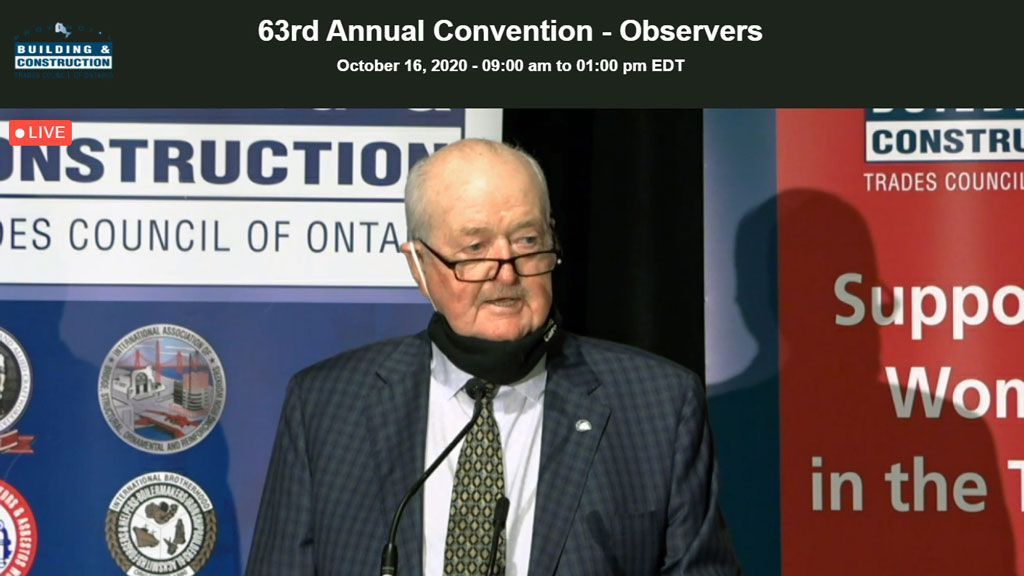Ontario building trades executive Patrick Dillon says he regrets that the provincial government felt it had to “blow up” the Ontario College of Trades (OCOT) but since it has, his council will work hard to ensure that essential components of the college that worked well are retained.
Dillon, business manager of the Provincial Building and Construction Trades Council of Ontario, delivered a report with the council’s phase one reform recommendations to the province’s new Skilled Trades panel during a recent consultation session.
The advisory panel in this phase has been tasked by Minister of Labour, Training and Skills Development Monte McNaughton with providing recommendations to replace the current services delivered by OCOT.
“They got caught up with the B.S. politics, some of it within the trades, but that is no reason to blow up the college,” Dillon said in an interview. “What they should have done was do a study to determine what the college was doing right. If the governance model wasn’t working, change the governance model, or change a couple of things the college could do better.”
The panel is asking stakeholders five questions including:
- What should be the role of industry advisory committees?
- How could improvements be made to the trade equivalency assessment process, while also maintaining both fairness and rigour?
- What should be the guiding principles for compliance and enforcement?
The Building Trades brief was emphatic that the system of trade boards established as part of OCOT must stay.
“It is essential to continue both the trade boards and the staffing of the trade boards by individuals who understand and are committed to the trades and apprenticeship system,” the brief stated.
“The trade boards were a significant improvement on the provincial advisory committees that operated prior to the Ontario College of Trades.
“In general, OCOT recruited knowledgeable and committed stakeholders to participate in the trade boards and provided the trade boards with capable staff support by individuals who understood and were committed to the trade system.”
Among the primary functions of the trade boards, the brief said, should be reviews of scopes of practice and occupational and training standards to ensure they are up to date; and reviews of the standards for awarding a Certificate of Qualification including the evaluation of experience and non-Ontario qualifications.
The Building Trades also argued it is essential that there be a construction industry council to provide a voice for the industry as a whole. As well, there should be an Ontario apprenticeship board composed of an equal number of employer and worker representatives from across the spectrum.
Construction deserves special treatment within the trades regulation system given its unique nature and the number of pieces of legislation that regulate the sector, the brief said.
“The real difference is, our apprentices graduate and they become journeypersons,” Dillon commented. “Those journeypersons teach the future workforce; the apprentice goes on to become a journeyperson, who becomes a foreman, who becomes a general foreman, who becomes a superintendent, and 80 per cent of the contractors in Ontario are former apprentices in their trade. There is no other sector that can say that.
“You can’t use one-size-fits-all when it comes to solutions for the apprenticeship system.”
The submission also said the Building Trades support changes that would make it easier for qualified people to become certified tradespersons, noting that the current system is burdensome on new Canadians with documented skills who currently find a slow path to certification.
“Ontario’s new trades and apprenticeship system should have ‘demonstration of skills’ testing centres where individuals can demonstrate their competence while being evaluated by persons who are knowledgeable in the trade,” the report said, praising the system the International Union of Operating Engineers Local 793 already has in place.
Addressing compliance and enforcement, the paper recommended that each existing construction compulsory-licensed trade be re-established as is; that the existing scopes of practice for the compulsory trades be continued; that enforcement of scopes of practice be “depoliticized and professionalized”; and that the current “silo approach” to enforcement in which OCOT had no legal mandate to take account of OLRB jurisprudence be reformed.
Follow the author on Twitter @DonWall_DCN.











Recent Comments